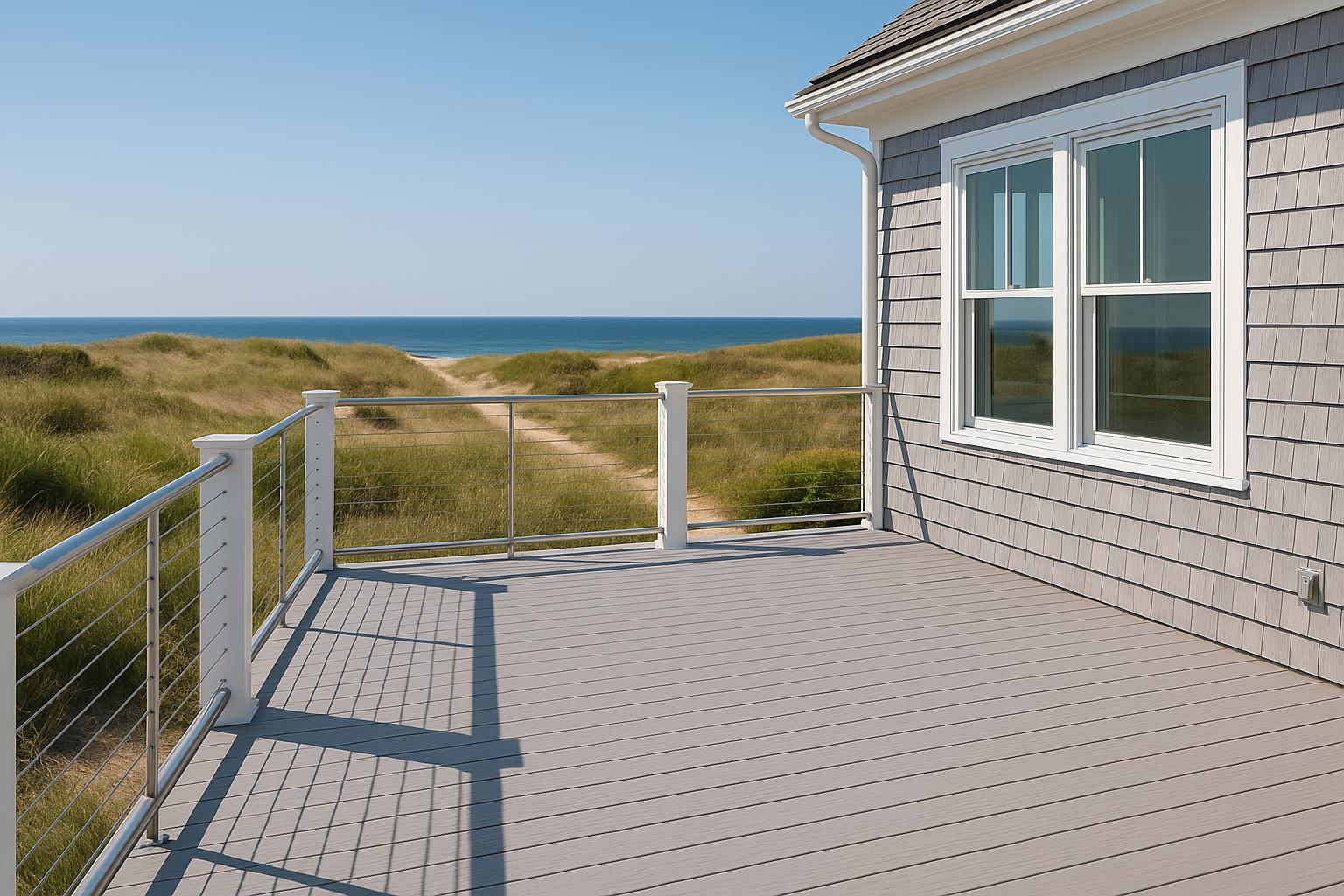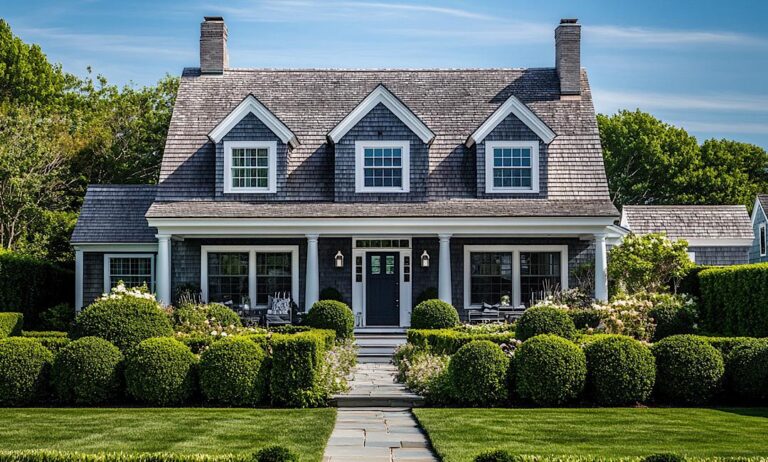Enduring Cape Cod’s Elements with a Smarter Outdoor Space
Living on Cape Cod offers a unique connection to the sea, but the coastal environment—with its salt spray, high humidity, and powerful nor’easters—presents a serious challenge for your home’s exterior. For homeowners in Harwich, MA, and beyond, a deck or porch isn’t just an addition; it’s an essential part of the coastal lifestyle. However, the relentless weather can quickly lead to decay, rot, and constant upkeep. If you’re tired of battling splinters and stains, it’s time to consider materials designed to withstand the harsh New England climate, ensuring your outdoor space remains a beautiful, low-maintenance retreat for years to come.
Learn more about our full range of home renovation and remodeling services with Capizzi Home Improvement, proudly serving Cape Cod homeowners.
Choosing the right materials is the most critical decision when planning a new deck or porch. The goal is to find a solution that resists moisture, salt, and wind without demanding yearly sanding and sealing. Fortunately, modern advancements in building materials offer durable, weather-resistant options that provide both longevity and aesthetic appeal, perfectly suited for the challenges of a shoreline property.
Top Material Choices for Coastal Decks and Porches
Composite Decking: The Low-Maintenance Champion
A leading choice for coastal applications, composite decking is engineered from a mix of recycled wood fibers and plastics. This blend creates a highly durable material that is remarkably resistant to moisture, rot, fading, and insect damage—all significant threats in a place like Harwich. Unlike traditional wood, it won’t splinter or warp, and its upkeep is minimal; a simple cleaning with soap and water is typically all that’s required to keep it looking new. Brands like Trex and TimberTech offer extensive warranties and a wide array of colors and finishes that convincingly mimic natural wood.
Explore Capizzi’s Deck Installation Services to see how our team can design and build a durable outdoor space that complements your coastal home.
PVC Decking: The Ultimate in Moisture Resistance
For homes directly on the water, PVC (polyvinyl chloride) decking offers superior protection. Because it contains no organic material like wood fibers, it is completely impervious to moisture, mold, and mildew. This makes it an ideal choice for areas with high humidity and direct exposure to salt spray. PVC decking is lightweight, highly moisture-resistant, and offers excellent stain and fade protection. Depending on color and exposure, it may warm up in direct sunlight, but overall it performs exceptionally well in coastal environments, ensuring your investment stands the test of time against the intense summer sun.
Pressure-Treated Wood: The Traditional and Economical Option
Pressure-treated wood remains a popular choice due to its affordability and widespread availability. The wood is chemically treated to resist rot and insects, giving it a longer lifespan than untreated lumber. However, it demands regular maintenance—including annual cleaning and re-sealing every couple of years—to prevent splintering, cracking, and moisture damage, which are accelerated by coastal conditions. While more budget-friendly upfront, homeowners should factor in the ongoing cost and labor of upkeep.
Beyond the Decking: Structural Integrity is Key
The longevity of your Cape Cod porch or deck isn’t just about the surface boards. The underlying structure and hardware are just as critical, especially in a corrosive salt-air environment. Here’s what to prioritize:
- ✓ Stainless Steel Hardware: Standard galvanized screws and fasteners can corrode quickly when exposed to salt. Stainless steel or hot-dipped galvanized hardware is essential to prevent rust and maintain the structural integrity of your deck.
- ✓ Proper Drainage and Ventilation: Ensuring adequate space between deck boards allows for proper water drainage, which helps prevent rot and mildew. A well-ventilated design allows air to circulate underneath, keeping the structure dry.
- ✓ Durable Railing Systems: Consider low-maintenance railing options like powder-coated aluminum, vinyl, or composite. These materials resist rust and decay and won’t require the frequent repainting that wood railings need in a coastal climate.
- For comprehensive design guidance, visit our Design Services page to see how we customize outdoor living spaces that thrive in Cape Cod’s unique environment.
Did You Know?
Some modern composite decking materials are made from up to 95% recycled materials, including plastic bags, milk jugs, and wood scraps. Choosing these eco-friendly options not only gives you a durable, long-lasting deck but also helps reduce waste in landfills, making it a sustainable choice for your home.
Read more eco-conscious tips in our article 10 Energy-Saving Upgrades That Actually Make a Difference on Cape Cod.
Designing for the Harwich, MA Landscape
Building in Harwich and across Cape Cod means embracing a design that complements the area’s natural beauty. A well-designed deck or porch should feel like a seamless extension of your home. Consider features like wraparound porches to capture different views and breezes throughout the day, or multi-level decks that define separate areas for dining and lounging.
At Capizzi Home Improvement, we bring decades of local experience to every project. We understand the specific challenges and building codes of the Cape Cod region. Our team is dedicated to a remodeling philosophy centered on quality craftsmanship and client satisfaction. We know that a successful project balances aesthetics with the durability required to thrive in a coastal environment.
Ready to Build Your Dream Outdoor Space?
Let our expert team help you design and build a deck or porch that stands up to the Cape Cod weather and enhances your home’s beauty and value.
Frequently Asked Questions
What is the best low-maintenance decking material for a coastal home?
Composite and PVC decking are the top choices for low-maintenance coastal applications. Both are highly resistant to moisture, salt, and insects, and they do not require the frequent staining or sealing that wood decks need.
How often do I need to clean a composite deck on Cape Cod?
Regular cleaning, typically once or twice a year, is usually sufficient. It’s a good practice to rinse off salt residue periodically with fresh water to prevent buildup. For more thorough cleaning, use a soft brush and a mild detergent.
Can I use pressure-treated wood for a deck near the ocean?
Yes, pressure-treated wood can be used, but it requires diligent maintenance to hold up in a coastal environment. You must commit to regular cleaning and sealing every 1-2 years to protect it from moisture and salt damage and prevent premature rot and decay.
Do I need a permit to build a deck in Harwich, MA?
Most deck construction projects in Massachusetts require a building permit, especially if the deck is attached to the house, is over a certain size, or is more than 30 inches off the ground. It is always best to check with the local Harwich building department for specific requirements before starting any work.



